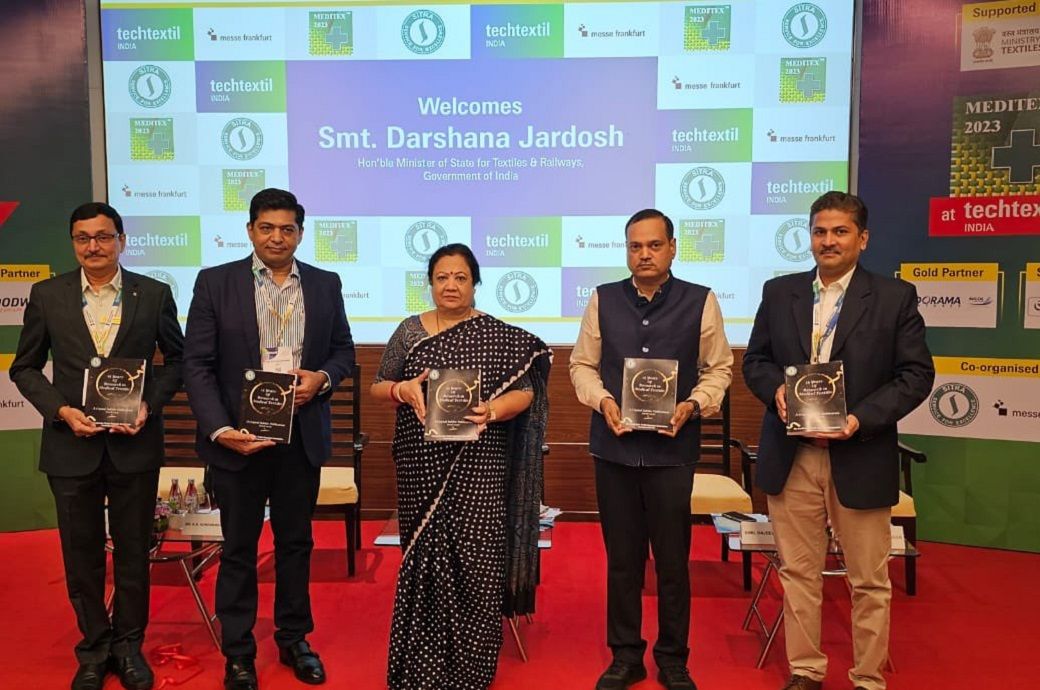
Jardosh, who was the chief guest at the event, reiterated about India’s transformation as the global leader of PPE Kits and masks. From being a non-producer of COVID Grade Personal Protective Equipment (PPE), India rose to become the world’s second largest producer and exporter of PPEs and N-95 Masks in a period of just six months during COVID times, according to a press release by the ministry of textiles.
The minister said that further, high level of collaboration must be fostered among research organisations, academia, and industries towards better utilisation of advanced technology. She highlighted that the government has been consistently providing policy support in the form of various initiatives launched including the PLI Scheme for Textiles, Prime Minister Mega Integrated Textile Region and Apparel (PM MITRA) Parks Scheme, and NTTM for strengthening the textiles and technical textiles ecosystem in India, holistically.
She urged various stakeholders to put forward their valuable inputs, which would pave way for creating a concrete roadmap for the future of the medical textiles’ industry in India and materialise the PM’s vision of Kartavya Kaal.
There were multiple technical sessions in the conference including ‘Recent Advantages and Prospects of Medical Textiles’; ‘Import Substitute: Scope and Demand of Indigenous Medical Textile Products’; Entrepreneurial Pathways in Medical Textiles – From Concept to Market; Future Direction of Medical Textiles; and Standards, Certification, and Regulatory Requirements. A book entitled ‘15 years of Research in Medical Textiles: A Crystal Jubilee Publication (2008–2023)’ was also released during the conference.
Officials and representatives from central ministries, user departments (health and medical) of central and state governments, institutes, industry leaders, scientific experts, researchers, and professionals related to medical textiles participated in the conference.
Rajeev Saxena, joint secretary, ministry of textiles, highlighted the vitality of medical textiles due to its direct correlation with quality of life, despite low share compared to Packtech and Mobiltech in India.
He stated that the market share of medical textiles is growing strongly in India on the back of profound R&D and skilling in the area. Further, there’s a need for repositioning of product focus in medical textiles in terms of the global market and domestic market.
Saxena emphasised that wider innovation and research is required in the medical textiles, especially focusing on novel technologies and indigenising the highly-imported medical textile items such as sanitary pads, diapers, and other surgical sutures, among others.
He added that the ministry of textiles is also working with CDSCO on regulatory aspects of different medical textiles. The textile ministry will soon be notifying quality control orders (QCOs) for six medical textile items including sanitary pads and diapers, among others.
Saxena also encouraged the industry and institutes to utilise the different guidelines under NTTM including R&D in technical textiles products and equipment thereof; Startup Guidelines (GREAT); and Education Guidelines 2.0, among others.
Dr Sailesh Pawar, scientist-F, ICMR-NIV highlighted the tremendous scope of indigenous development of medical equipment in India. Medical textiles are set to play a pivotal role as India is preparing for health emergencies similar to the COVID-19 pandemic.
Moreover, innovation in terms of bio-degradability is the need of the hour for strengthening sustainability and recyclability in the textiles industry, especially in the medical textiles landscape.
SK Sundararaman, member, council of administration, South India Textile Research Association (SITRA), appreciated the initiatives taken by the ministry of textiles to promote the technical textile sector.
The ministry of textiles had partnered with SITRA to organise Meditex 2023 on September 13, 2023.
Fibre2Fashion News Desk (NB)

